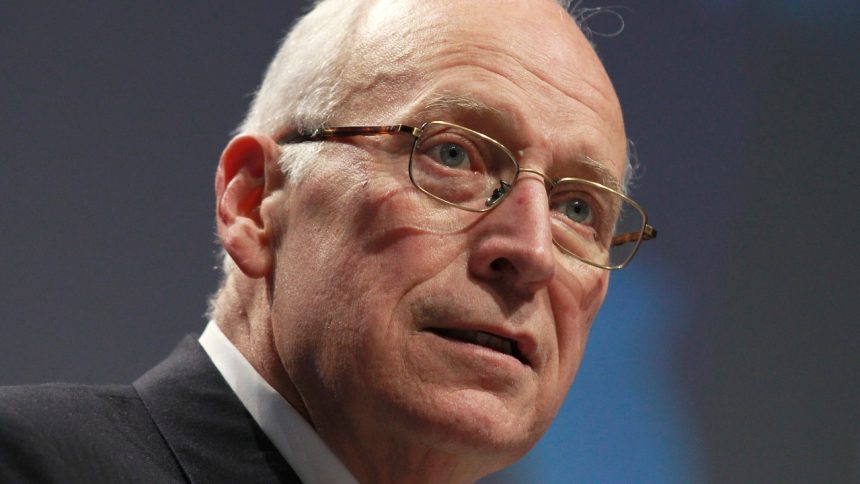The world of American politics marked the passing of a formidable figure this week. Former Vice President Dick Cheney, a man whose influence shaped decades of U.S. policy and who was widely regarded as the most powerful person to ever hold his office, has died. He was 84 years old. His death was announced by his family, closing a long and complex chapter in Washington’s history that stretched from the Cold War to the war on terror, and leaving behind a legacy that continues to spark debate today.
Cheney’s final days were spent surrounded by his wife of 61 years, Lynne, his daughters Liz and Mary, and other loved ones. The family confirmed he died on Monday night from complications of pneumonia and cardiac and vascular disease. This conclusion follows a decades-long, public battle with severe heart problems that had long made him contemplate his own mortality, with Cheney himself often feeling he was living on borrowed time. His passing brings an end to the life of a true Washington insider who served as a congressman, White House chief of staff, secretary of defense, and, most prominently, as the strategic and often controversial vice president under George W. Bush.
A Lifelong Struggle with Heart Disease
The specific causes cited for Dick Cheney’s passing—complications of pneumonia and cardiac and vascular disease—were, in many ways, the final challenges in a lifetime of serious health struggles. To understand his death, it’s essential to look at the history of his health. Cardiac disease affects the heart itself, while vascular disease impacts the blood vessels and circulatory system; together, they form the leading cause of death in the United States. For Cheney, these were not new adversaries.
You Might Like: Beyond the Blockbusters: The Real Value of Laura Dern’s Career
His first heart attack struck when he was just 37 years old in 1978, and he would suffer four more in the decades that followed. This long-standing coronary disease defined much of his adult life. While serving as vice president, he disclosed that he had the wireless function of his defibrillator turned off due to a fear that terrorists could remotely send his heart a fatal shock. His health issues escalated after leaving office. By 2010, he was in end-stage heart failure, contemplating death, and unable to perform simple tasks like climbing stairs. To stay alive, he had a left ventricular assist device (LVAD) implanted in his chest—a pump that supports the heart’s main pumping chamber.
RIP: Former Vice President Dick Cheney has died. He was 84.
Cheney, who served two terms as vice president under former President George W. Bush, died “due to complications of pneumonia and cardiac and vascular disease,” his family said in a statement. pic.twitter.com/SveekpTHn2
— Breaking911 (@Breaking911) November 4, 2025
In a remarkable turn of events, Cheney underwent a successful heart transplant in 2012 at the age of 71. The surgery gave him a new lease on life, and he was reasonably active for years afterward. However, at 84, he fell into a high-risk category for pneumonia, where the infection can be particularly severe. Medical experts note that individuals over 65, especially those with chronic diseases, are especially vulnerable to serious complications from pneumonia, which ultimately proved too much for his system to handle alongside his longstanding heart and vascular conditions.
The Legacy of a Powerful Vice President
Beyond the details of his health, Dick Cheney’s legacy is one of immense, often unchecked power. He served two terms as vice president to George W. Bush, and in that role, he became the chief architect of the nation’s response to the 9/11 terrorist attacks. It was Cheney who first took charge on that fateful day, urging the president to stay away from Washington for his safety. In the years that followed, he was the mastermind behind the U.S. invasions of Afghanistan and Iraq and a key advocate for counterterrorism policies that included the use of torture and enhanced domestic surveillance.
He approached his role with a singular, unwavering focus. “Tell me what terrorist attacks you would have let go forward because you didn’t want to be a mean and nasty fellow,” he challenged in a 2013 documentary, framing his actions as a necessary duty to protect the United States. This mindset made him a lightning rod for criticism, but also established him as a central figure in defining America’s role in the world for the early 21st century. Even after leaving office, he remained a vocal critic of the Obama administration’s national security policies, arguing they made the country less safe.
Dick Cheney’s passing is not just the loss of a former official, but of a man who fundamentally believed in the aggressive exercise of American power and whose influence on the nation’s political landscape will be studied and debated for generations to come.



